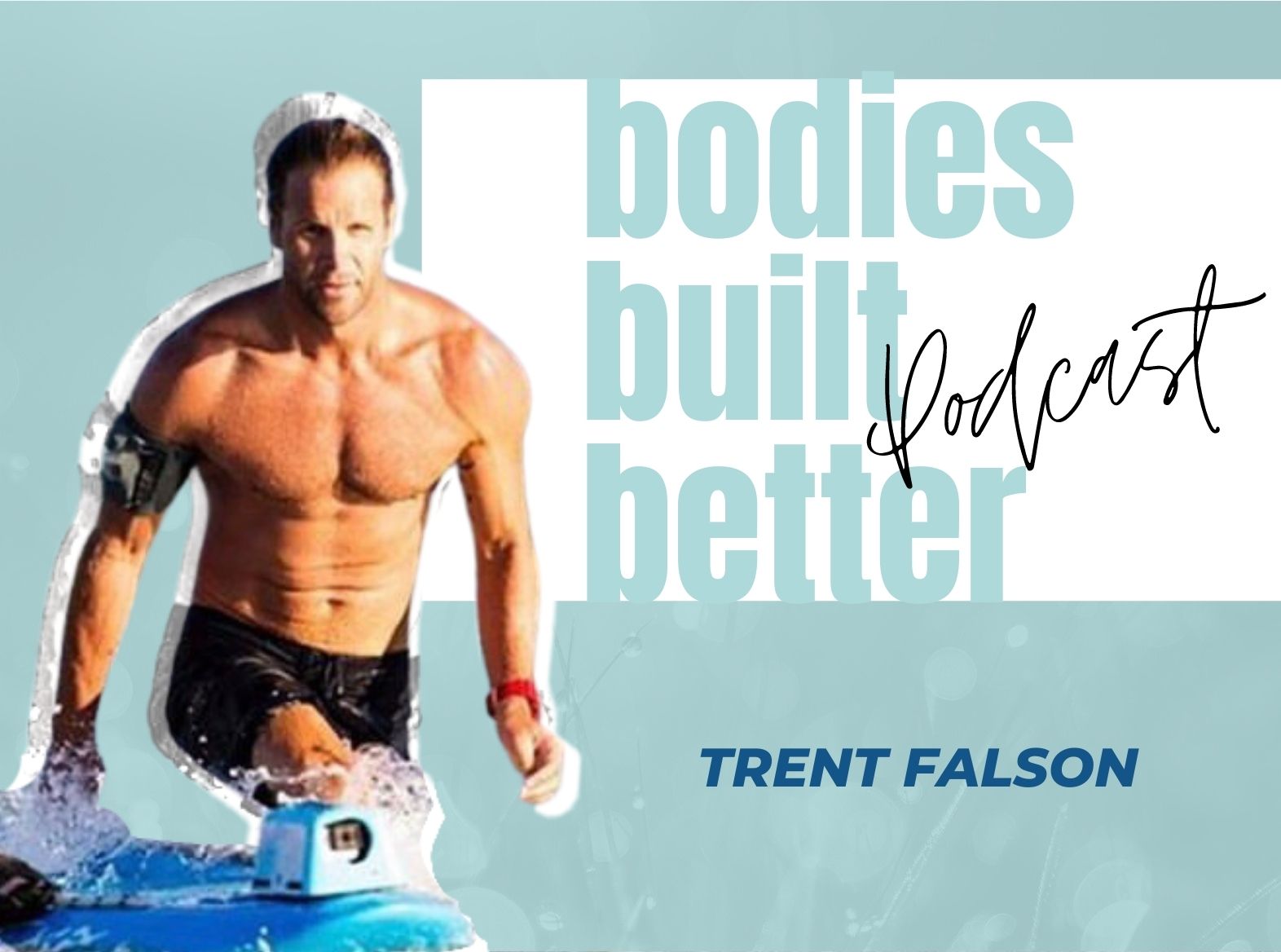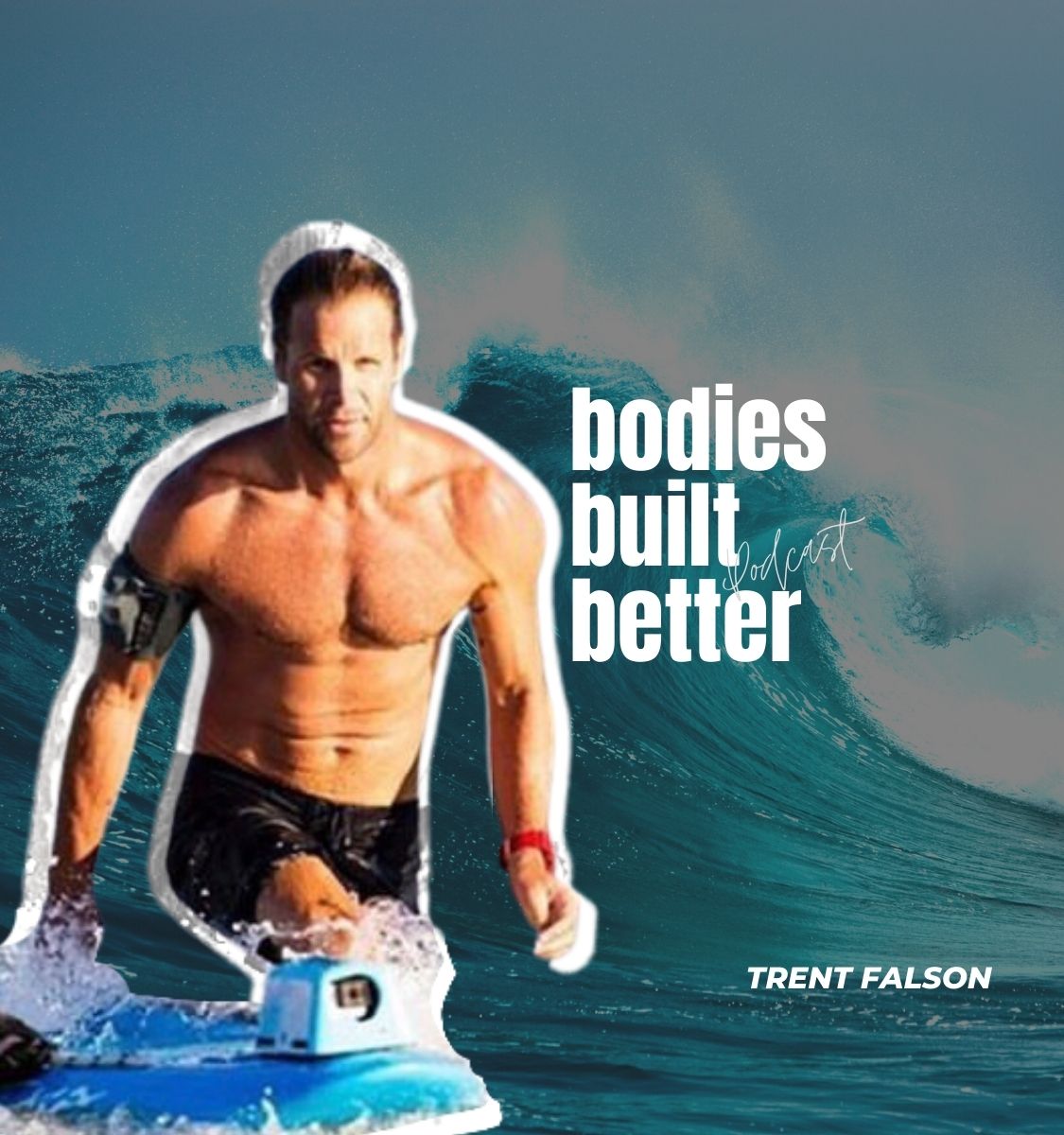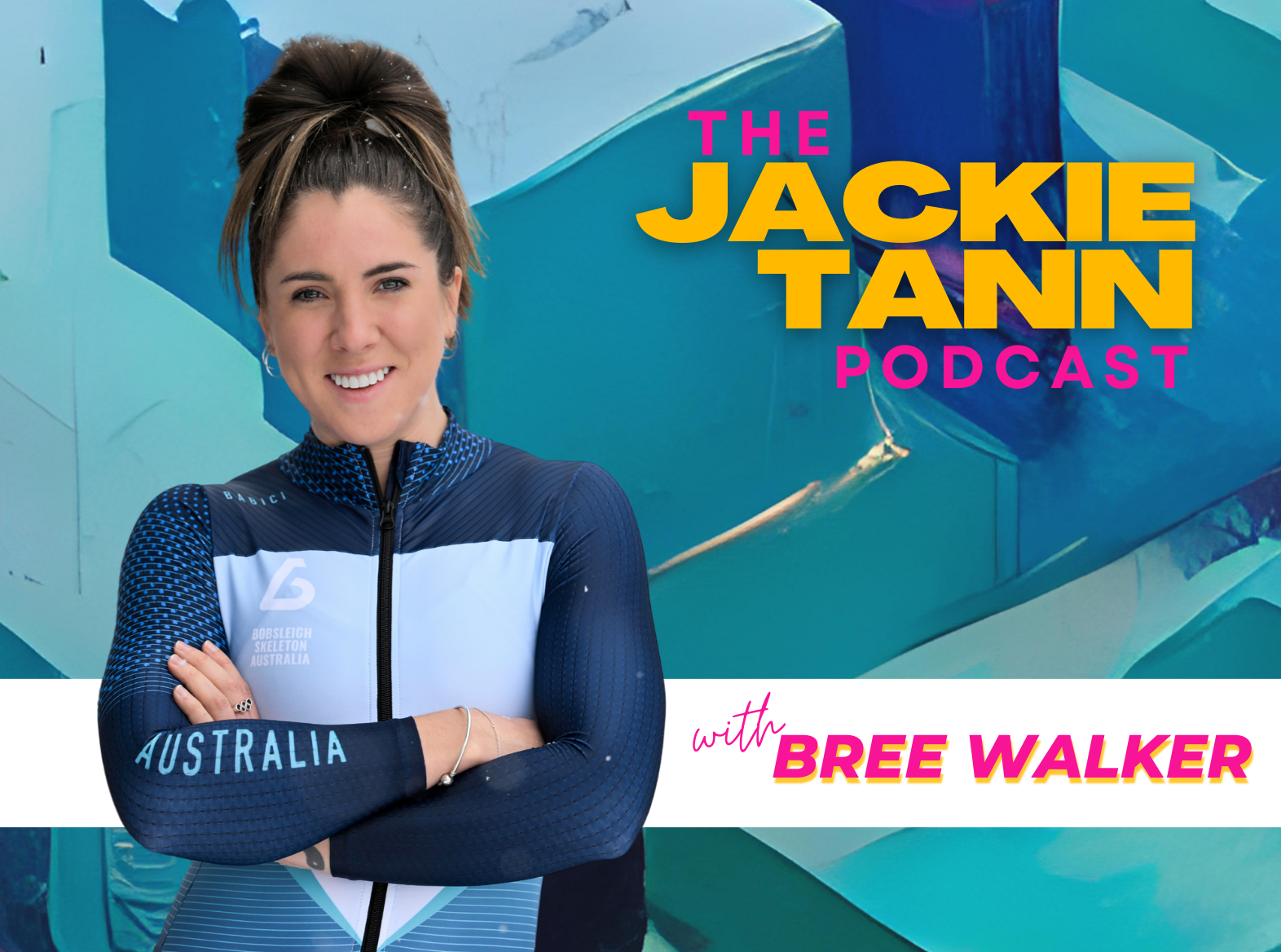“A Fish In A Past Life”: How Trent Got His Start
Jackie 2:55
Trent, thank you so much for chatting with me today. Welcome to the Bodies Built Better podcast.
Trent Falson 3:01
Thank you, Jackie. awesome to be here. A massive fan of the show.
Jackie 3:07
Glad to hear it. Great to have you on. You are a professional lifeguard. You’ve been on the hit show Bondi Rescue. And recently, you’ve had major surgery and it’s taken you out of the thing that you love to do most. We’re going to talk about what that means physically and mentally. But before we do, I’d love for you to talk a little bit about you growing up by the beach, and how that played a part in you becoming a lifeguard.
Trent 3:45
Yeah, so that was very much meant to be almost, you know, when I was born, we lived pretty much like 50 metres from the surf. When we were living, when I was a young toddler and baby, I spent all of my time when I was young at the beach, obviously. And that went right through to when I was you know, a young kid I went through like we call it nippers, which is like the Volunteer Surf Lifesavers, young. You know, when you’re young kids, you get through that on Sunday mornings, which is amazing. I surfed pretty much with all my mates when we were young every day. And then went through into the Volunteers’ Surf Lifesaving Club, which is like the red and yellow caps, and you go into your volunteer patrols every weekend. And there’s also a competition element where you train and race each other and in the sport of Ironman. I’m not sure if you’re familiar with it, but I was involved in all of that at a sort of higher level throughout my younger days. And then a natural progression from that was to join the lifeguard service which was held in high esteem in the area for many, many years and it’s got a really good lineage and very respectable. So natural progression now was for me to try out for lockouts and yeah joined when I was not even 18.
Jackie 5:09
Yeah, it sounds like you were a fish in a past life.
Trent 5:13
That’s right. I’m very much a water creature, if you’ve ever seen me on land, I’m not a land creature at all. I trip over my own feet. And yes.
Jackie 5:20
I think they say that about swimmers, actually, lazing in the water.
Trent 5:26
Yeah, you do not want to see me on land yet, but it’s always best off that I’m close to or in the water. Yeah,
Lifeguarding And The Essence of Sydney Bondi
Jackie 5:33
Well, let’s talk a little bit. Firstly, about lifeguarding professionally. And you know what that actually means to be a professional lifeguard in terms of, I guess, the fitness requirements to be a lifeguard.
Trent 5:48
Yeah, so it’s a large portion of the guys that I work with in the service, we all grew up together, surfing together on the local beaches. And I think that’s part of what gives us the ability to do our job very well is that we know the beaches like the back of our hand, we’ve surfed them since we were young, we’ve seen a lot of things in the surf that form your expertise. And so those guys that I grew up surfing with, we’re all working together now. It was a natural sort of progression into going into the lifeguard service. And it is a very highly held position in the community. We’ve lucky to have a great sort of reputation in our own community and you know, the essence of those of Sydney Bondi. And, yeah, it’s, it’s something that means a lot to all of us, we take our job very seriously. And all of the trimmings that go with the bits, helping the community, putting back into the community, it’s saving lives, the big things, those are really important to all of us. And we don’t take that lightly at all.
How Fit Do You Have To Be As A Lifeguard?
Jackie 7:00
And what about in terms of fitness requirements? Do they look at you and go, “Have you been surfing all your life in the area?” That’s all it takes? Or do they go, “Well, you need to be able to swim?”
Trent 7:13
Yeah, very comprehen–It’s a pretty rigorous selection criteria. So surfing knowledge is very important. That’s seen as the bread and butter of our work, if you like, being able to pick the conditions, being able to pick the surf, being able to pick the fastest possible way out to a patient in the water, which means using the ocean to your advantage. But also off the back of that we have fitness requirements. So on a day where new recruits are invited to try out as well, we do an 800 metre pool swim in under 30 minutes, which is 32 laps of a 25 minute pool if you like. So that’s in the morning, and then straight after that, we’ll go down to the beach and do an Ironman course which consists of a surf swim, I think it’s out 600 metres and then a board paddle with our rescue boards, and then a run and then we do that twice through which is about 25 minutes. So it’s, it’s demanding and it’s gruelling. And if you haven’t had a background in Surf Lifesaving or surfing, it can be quite, like I say, gruelling. So we find that we have a mix of people coming through and joining our service but predominantly the key quality seem to be people that have come from the surf and or at least some pool swimmers have come through surf swimmers, that kind of thing. But yeah, that’s the fitness.
What It Means To Swim 800 Metres
Jackie 8:44
So that 800 metres is in a pool?
Trent 8:46
Yes, correct. So we do the 800 metre swim in the pool. And, yeah, it’s something that the boys are still getting, the boys and girls still get nervous about. You know, you can do it, but you don’t want to have a shocker in the morning and, you know, not pass or do a bad time. And everyone’s pretty competitive on the service. So we’re all looking at each other’s times and who did what for, you know, the 800. So that’s like, how we’ve been high-esteem on the service. So yeah.
Jackie 9:17
Well, I have to ask now, what’s the best time for an 800 metre swim? Do you know?
Trent 9:23
Yeah, I do. I [think] one of the guys did. The average time for most of us lifeguards is probably between, you know, ten, eleven minutes, I want to say around that sort of mark from ten, ten-thirty. I think eleven minutes is pretty much an average time if you brought it down. There’s been a couple of the guys that have done nine minutes.
Jackie 9:42
Whoa!
Trent 9:43
Nine minutes thirty or something like that. And these are basic ex-sportsmen that have just absolutely, you know, mowed it down like it’s so good to watch. People going like that in the pool.
Jackie 9:55
And then does that translate really well to the ocean though?
Trent 9:59
It can, and it also can’t. So, good question, because it doesn’t always necessarily. You can be an absolute Gandalf swimmer, and then go down to the surf. And it’s a totally different environment. So the traits of good pool swimmers, obviously fitness technique, knowing the pool, and having that background, the traits of good surf swimmers or being able to read the conditions, find, again, the fastest possible way out to see using the ocean to your advantage, and that kind of thing. So they’re quite different sorts of qualities, or there is a good crossover there. If you know there are a lot of good pool swimmers who have to do surf swims as well. So yeah, very good question. Not always one leads to the other.
Swimming By Instinct
Jackie 10:42
Yeah. You mentioned before, obviously, having surfed pretty much all your life that, you know, you know the ocean. So you must have this really good instinct, I guess for danger. When? I mean, when have you used that when you’ve been out on duty?
Trent 11:05
Yeah, that’s a really good question. And I think a common trait of a lot of us lifeguards is this inherent ability to be able to see something before it happens, or this sense of something’s not right. And we talk about this all the time. And, you know, we’ll be down at the beach scanning thirty-, forty-, fifty-thousand people in the water some days at Bondi over the Christmas breaks. And people always ask us, “How do you know where to look?” Like, there’s just heads everywhere.
Jackie 11:33
Exactly.
Trent 11:35
And you just know, it’s this kind of, it’s a skill that you build up in. And like I said, it’s inherent, you feel like I’ve been at work, and I’ve looked a certain way down the beach, and don’t know why I was looking down that end of the beach, but, you know, someone was starting to get into trouble. And it’s like, you just know, so there’s a really kind of natural feel for what’s going on. And it gets to the point where some days you’re on your day off, and you’re just at the beach, walking along getting a coffee with a friend or something and you see something like someone getting into the early stages of getting into trouble. You know [that] they don’t know they’re in trouble yet. But you can see what’s about to happen next and predict it. And lo and behold, next thing, they get caught in a rip, and you know, they’re calling out for help. And then you make sure that someone’s nearby which there’s no way [there’s] a lifeguard close, but you’ve seen that even before it happens.
The Life Of An Off-Duty Lifeguard
Jackie 12:29
How many times have you been at the beach off duty? And then worked?
Trent 12:34
Yes. Many, many times. I mean, I’ve even been at, you know, one of the bars across the road from North Bondi having a drink with friends. And it was sunset after the lifeguards were going home. And a small child got into trouble in a rip like that next to the rocks at North Bondi. And I had to run out of the camp, and start stripping my shirt off, shoes off, jeans off, and you know, run in water and help out. It’s the kind of thing that you never ever get to switch off. Yeah, as much as you try, you’re always looking. And so the other thing is, you know, when we’re surfing on our days off, and things like that, you will nearly always do what we call an Assist, which is a swimmer will start to get into trouble out there. You’ll see before it happens and paddle over to help them give them some direction and guidance. And that way they find their way back onto the sandbag. So a lot of the times [that] you’re doing that kind of thing as well on your days off. So yeah, there’s a lot, we call them unofficial rescues.
Jackie 13:34
What do you actually do and like when you want to have a holiday or break? Do you go to the beach or like no?
Trent 13:44
Yeah, we don’t go to the beach. If you want to have a day off for a holiday, you go to the snow or you go to like, you know, to the cities or something like that. Or the parks. You don’t go to the beach because you’re doing some form of work. Golf course is a great one.
How Neck Pain Led To Spinal Surgery
Jackie 13:58
Yeah, brilliant. Well, let’s talk about your surgery. Spinal Surgery. Tell us about it.
Trent 14:07
Yeah, so I want to say last year was my worst, one of the worst years of my life. It had been detected that I was having neck pain. And off the back of that I was having radial nerve pain down my arm. And you know, I kept working with it and thinking that it’s going to be okay, and you take the painkillers and whatnot. And I got an MRI and got my MRI results back and hadn’t gone and seen a surgeon yet. That was waiting. We’ve always put things off, don’t we? You know, we’ve been busy or you know, this will go away, this nagging ache. And inevitably at work, you’ve got to the point where it is hard to manage the job as well as you know, the injury. And I was in a situation where I’d sort of taken some time, downtime from work, stood myself down. And I went and saw a spinal surgeon, neurosurgeon in Sydney. And I was told that I needed my, the damage in my neck was quite severe. And I needed my neck fused two levels and a cage put in, which was just huge. I mean, I was expecting him to say, Oh, we might put some cortisone in this, or give you some exercises to fix this. And so that just floored me. I remember walking out of there and thinking, I can’t use my ankle, what? What does this even mean? […] So, got a quick second and third opinion, second opinion was diffuse, again, a very reputable spinal surgeon. Third opinion, who was my surgeon now, said to me, “Look, I think we can put up an artificial disc in the C5-C6, and that’ll do the job.” And so I said to him, that sounds good to me. That’s the least invasive procedure that we can do. So let’s start with that. And yeah, I booked myself in in November, last year, and I got it done, but I just was, yeah, there was a wave of emotions going on and a lot going on. So yeah. booked in and got the surgery in November last year.
Jackie 16:18
Leading up to that. I mean, how long did you have the pain for? And do you remember anything that set it off?
Trent 16:28
No. And you know, I get asked this a lot. Like, what, “how did you do it?” Yes. Like it’s not a “How did you do it?” injury? It’s what we call a wear and tear injury, degeneration and just worn the discs down in the facet joints down through surfing, paddling in the surf, lifeguarding and just swimming in the surf and all of that neck banging into you know, sort of those positions that necks don’t always like.
Jackie 16:54
Yeah, I’m trying to think like, is it that extension? Extension? Yes.
Trent 16:59
Almost hyperextension Yeah, like, when we paddle our rescue boards, a lot of the time we’re on our knees and, you know, our neck is kinked up with a longer extension, we’re looking at, you know, out to see with, you know, sort of even lying down surfing you next up in that extension, sort of hyperextension almost. And there’s a very famous term, surface neck, which is a, is an extension injury to the neck. So yeah, wear and tear. And it just got worse and worse. And it got to the point where like, you know, even doing rescues was pretty painful. And, you know, I was icing it after and whatnot. And yeah, I was like this is it’s time to do something about this.
The Surgical Procedure
Jackie 17:40
Yeah. How long did the surgery take?
Trent 17:43
So the surgery was amazing. I was in hospital for two days, which is a lot quicker than I thought it would be. I was up on my feet the next day, and what, had to wear a neck brace for two weeks after and I was obviously like, go home. And then the process from there was quite lengthy. I think it’s, I want to say two months to getting like and you know, the brace off getting a little bit of mobility back and whatnot. But the, for the most part, the hospital component of it, the surgery itself. I think he gets them. The surgeons are amazing. I think he gets them done in a few hours. Like, literally, I got cut, sort of opening the front of my neck. So they go in through the front of your neck, they–it’s incredible. They move your windpipe and all of your big arteries aside. And then they go in through the front. Take out the old disk. I’ve seen there’s a bit of a malice involved and there’s some there’s some you know, if you haven’t seen what you probably don’t watch–yeah, it’s on YouTube. Don’t YouTube anything. Anyway, yeah, luckily I YouTubed it after but yeah, and so they take out the old disc and then they put in the prosthesis which goes in again through the front, they fix it to the back of your spine, next to the facet joints and clamp it on, clamp it and close you up and then you know you’re out of there. So it’s, it’s a very sort of, it’s a vast procedure for what it is. Yeah. Yeah, it’s, it’s amazing. So and the recoveries quick because it’s, it’s, you know, they take a small scar in the front of your neck and and you know, once that scar heals, I think mine was glued that he needed stitches, like it’s Yeah, so I’ve got very small scar there now.
Jackie 19:39
Wow. So you were in a neck brace for two months?
Trent 19:44
Correct. Sorry. Now if it was three, it was two to three weeks in the neck brace and then just getting your mobility back after having the neck brace on is weird. You get this hypervigilance to bumping you know, too quickly. All of that, you know, getting in and out of the car was difficult because I was like, Oh, if a bump is the wrong way, or if there’s a lot of all of that going on, I want to say two months getting a little bit of movement back in and and like, yeah.
The Rehab Process
Jackie 20:16
What was the rehab like? Like, do you leave the hospital and they go, you know, this is what you should be doing for the next 2, 3, 6 months? Or is it like, go see someone and on your way?
Trent 20:31
Yeah, no, that’s a really good question. And I was fortunate that my I had like an integrative health care sort of plan from so my surgeon Dr. Mobbs, works really well with a place called Elite Spinal Physio Pilates, so and they did, you know, specialists in spines and physio and so moving on from Dr. Mobbs, who’s the surgeon you go to Elite Spinal, and then they look after your rehab, like going forward. So it’s, it’s integrated, which is really great, because the surgeon talks to the physio, the physio talks to the surgeon, they check in with each other and review your progress at three months. And so I felt like I was in very good hands been part of a, you know, a team. And I didn’t have to worry about the rehab because it was all planned and taken care of, for me, which is great. And the big component of that has been planned pilates, reformer Pilates. Neck is in a, you know, sort of safe position. You know, and the Reformer is great. You don’t move your neck a lot, you build up, strengthen your core and all of that. Yeah, that was all part of the rehab process. Yeah.
Jackie 21:37
Tell us more about that. Because it’s not like it’s not like a shoulder where you’re building the muscles around. Like, it’s the neck is supposed to be really stable. Obviously, we still need movement. What is what is going through your mind when you’re doing? You know, whether it is Pilates? She’s like, Are you keeping everything really still, in rigid? Or are you allowing yourself to have a little, little bit of movement? So you don’t stiffen up? What’s what’s going to be?
Trent 22:07
Good question. Also, it’s, it’s, so when you’re doing the exercises, in that environment, there’s always a towel placed behind your head and the neck just so that supporting your neck is always paramount. And key, obviously. So when you’re doing some of the reformer exercises, and some of the floor exercises, even for your core, and the like that, we’ve maintained a towel placed, you know, in this, you know, that sort of small part of the neck there, behind the head, so that it’s been able to, you know, isolate too much neck movement while you’re doing that type of work. On the other side, when you’re doing sort of more, I guess, like you’re walking and you’re just doing the general movement exercises, they encourage you to move your neck as quick as possible, because you don’t want to get like stiff in the neck, and then all of the muscles, you know, sort of, I guess, erode around the neck. And so you need to keep all of that strong, but you’re sending it to keep movement. So but controlled movement. You know, I remember doing a lot of chin tucks, it’s a big one for cervical surgery like you do the chin tucks where you give yourself a double chin and you know those ones and all that kind of thing. So yeah, they give you these little book of exercises […]. Yeah. So there’s a mix of, you know, controlled neck position plus movement.
How Trent Is Recovering Now
Jackie 23:25
How has it all been going? Have you had any setbacks? How are you feeling?
Trent 23:28
Oh, setbacks. Wow. Yeah, there’s, there’s a lot there’s been a lot of setbacks. Yeah, it’s, I’ve learned that a lot of this spinal surgery and surgery and chronic injury is about managing your expectations. I went into surgery last year thinking that after three months, I was going to be back to my absolute best lifeguarding again, within six months, you know, all of the things just brand new, however, haven’t gone like that at all we’ve had, we’re still having some problems with it, in that, we don’t know why it’s not really coming along like it should. It’s largely better, I’ve much better movement in it, but I’m still getting pain in the neck sort of localised and if I do things like swimming can flare it up a little bit. So we’re still in the, you know, that sort of, I guess, the trenches with it, where we haven’t sorted it out yet. And I’m coming up to a year next month. So what I’m learning about spinal surgery is that it can take a long time, and there are many, many setbacks and you know, even the surgeon at once they just like, you know, probably the process of elimination, it’s the visit not muscular that’s causing the pain. Is it the facet joints, you know, we’re now looking at maybe the facet joints are a little bit sort of, like out of, out of shape, do we need to sort of fix the facet joints? I just had two cortisone injections put in a month ago. So yeah. When you talk about setbacks, I’m still riding one out. Yeah.
Where to find Trent
Instagram:@trentfalson
Listen to more inspiring conversations about endurance, performance, and the potential of the body. Check out our podcast archives!












